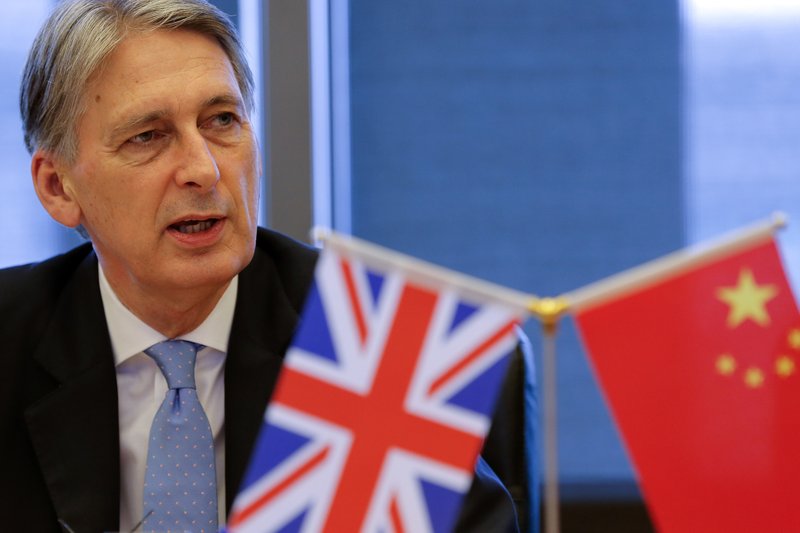LONDON -- Britain's economy appears to be shrinking at its fastest pace since the global financial crisis as a result of the vote to leave the European Union, but the rest of the region is holding up, surveys showed Friday.
The findings came as global financial leaders meeting in China identified the uncertainty generated by the United Kingdom's decision to exit the EU, the world's biggest economic bloc, as a key risk to the global economy.
But while the International Monetary Fund has trimmed its world growth estimates, surveys of hundreds of business executives in Europe indicate the economic damage is so far largely contained to Britain.
The so-called purchasing managers' index for Britain -- a gauge of business activity closely watched by investors and policymakers -- fell to 47.7 points in July from 52.4 in June. The figures are on a 100-point scale, with the 50 threshold separating growth from contraction.
The survey, conducted by IHS Markit, is one of the first official measures of how the economy responded to the vote, and is based on questionnaires sent to executives in over 1,200 companies between July 12 and Thursday.
"July saw a dramatic deterioration in the economy, with business activity slumping at the fastest rate since the height of the global financial crisis in early 2009," said Chris Williamson, chief economist at Markit. "The downturn, whether manifesting itself in order book cancellations, a lack of new orders or the postponement or halting of projects, was most commonly attributed in one way or another to Brexit."
By contrast, the equivalent index for the 19-country eurozone dropped to 52.9 points from 53.1 in June. The drop was relatively small and suggests continued economic growth of about 1.5 percent annually.
A departure from the EU could mean companies based in Britain are cut off from the bloc's single market, which guarantees no tariffs on trade and the free movement of workers and money.
The uncertainty over Britain's trade relations, which will take years to renegotiate, is causing companies to hold back investment and hiring or even to make cuts. That could include European companies that are unsure about the future of their operations or sales in Britain.
The weeks of British political uncertainty, with the prime minister resigning after the vote and the main parties in disarray, also hurt confidence.
The Markit survey found that in Britain both business output and new orders fell in July for the first time since the end of 2012. Their drop from the previous month was the steepest in the survey's history.
The measure of service providers' optimism about the coming 12 months slumped to a seven-and-a-half year low. Manufacturers reported job cuts.
The report noted there wasn't an increase in business costs, which some are fearing as the plunge in the pound since the vote will make fuel, raw materials and imports more expensive. Those rises were offset in part by subdued wage inflation.
Michael Hewson, analyst at CMC Markets, said the survey findings were worse than expected.
"The big and important question now is whether this slowdown heralds a more permanent economic condition, or whether in the final days of July, we get a pickup in activity now that we have a more stable political environment and the Brexit fog has started to clear a little."
The findings will cement expectations that the Bank of England will provide more monetary stimulus to the economy at its next meeting in August, experts say.
Britain's new Treasury chief, Philip Hammond, said he would be prepared to use the next budget update, called the Autumn Statement, to help the economy in the event of a downturn.
"We will have the opportunity with our Autumn Statements ... to reset fiscal policy if we deem it necessary to do so in light of the data that will emerge over the coming months," he said on a visit to Beijing ahead of a meeting of G-20 finance ministers in Chengdu.
IMF head Christine Lagarde called on European politicians to quickly end the uncertainty.
"Our first and immediate recommendation is for this uncertainty surrounding the terms of Brexit to be removed as quickly as possible so that we know the terms of trade and the ways in which the United Kingdom will continue to operate in the global economy," she said in Beijing.
Investors are watching the G-20 meeting for any sign the United States, Germany, China and other major economies may agree on coordinated action to accelerate a weak global economic recovery.
But U.S. Treasury Secretary Jacob Lew, speaking to reporters in Athens before flying to China, downplayed the likelihood of aggressive joint action.
"I don't think this is a moment that calls for the kind of coordinated action that occurred during the Great Recession in 2008 and 2009," Lew said. "It really is a moment where we each need to do what we can to ensure that where growth is soft it gets stronger and that prospects for the medium- and long-term are improved."
Information for this article was contributed by Joe McDonald and Elena Becatoros of The Associated Press.
Business on 07/23/2016

